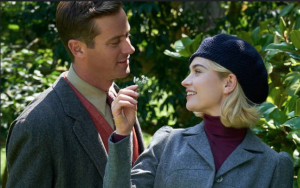REBECCA: 2 ½ STARS. “haunted by the ghosts of the story’s previous incarnations.”
 What the new remake of Daphne du Maurier’s “Rebecca,” starring Lily James, Armie Hammer and Kristin Scott Thomas and now streaming on Netflix, lacks in gothic thrills it makes up for in eye candy.
What the new remake of Daphne du Maurier’s “Rebecca,” starring Lily James, Armie Hammer and Kristin Scott Thomas and now streaming on Netflix, lacks in gothic thrills it makes up for in eye candy.
Taking over as handsome widower Maxim de Winter, the role Laurence Olivier made famous in Alfred Hitchcock’s Oscar winning 1940 film, is Armie Hammer. Max is a charmer, a trust fund aristocrat with a beautiful estate, called Manderley, and a dead wife, named Rebecca.
On vacation in Monte Carlo a young woman (Lily James) catches his eye when she is refused service on the balcony of a fancy hotel restaurant. She is not a guest, she’s told, but an employee of a guest and therefore must eat elsewhere, anywhere but among the wealthy tourists enjoying their canapes and champagne. He invites her to join him and a whirlwind romance ensues. When her boss decides it’s time to travel to New York for debutant season, Max asks her to stay with a marriage proposal.
They move to Manderley, his family home on the windswept English coast. The sprawling home has been in his family for generations and is so grandly appointed it makes Downton Abbey look like an outhouse. At Manderlay the romance, which blossomed quickly, fades as the specter of Rebecca, the late lady of the estate, hangs heavy over the house and on Max’s mind.
Keeping Rebecca alive in heart and in mind is Mrs. Danvers (Kristin Scott Thomas), Manderley’s baleful housekeeper. She is not impressed by Max’s naïve new bride who she thinks is trying to take Rebecca’s place.
Cue the dirty tricks, withering glances and gothic tomfoolery.
“Rebecca,” directed by Ben Wheatley, is undeniably beautiful looking. From its good-looking stars to the sumptuous production design is by Sarah Greenwood, it will make your eyeballs dance. The set decoration at Manderley alone is “Architectural Digest: Baroque Edition” worthy, but this is a movie that wants to appeal to more than just your eye and that’s where it disappoints.
The bones of the story seem perfect for a 2020 revisit. du Maurier’s exploration of the power imbalance between a wealthy man and a woman who must fight to find her own sovereignty is timely but undone by a story that never takes hold.
Hammer’s take on Max misses the essential coldness of the character. He’s short tempered, snippy and brusque but the icy core necessary to freeze out the new Mrs. de Winter is missing. Without that character element his reactions to events don’t bring the friction needed to engage the audience. At the pivotal ballroom scene, where the new bride is (MILD SPOILER ALERT) tricked into making a serious error in judgement, Max seems irked, pouty but the wound that is unintentionally opened doesn’t seem particularly deep. If Max doesn’t care that much, why should we?
From that moment on Wheatley drifts through the story with none of his patented risk taking—think his daring adaptation of J.G. Ballard’s “High-Rise” or his edge-of-your-seat “Kill List”—relying Clint Mansell’s score to provide the emotional highs and lows.
Like the story’s female protagonist the new version of “Rebecca” is haunted, this time by the ghosts of the story’s previous incarnations.
